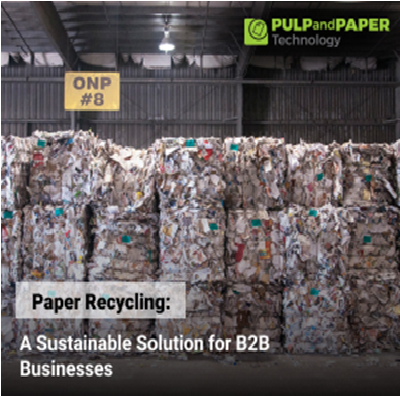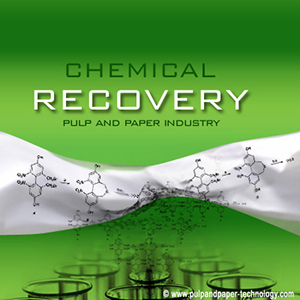Paper Recycling: A Sustainable Solution for B2B Businesses

Introduction:
In our contemporary world, where environmental consciousness is on the rise, sustainability has emerged as a prominent theme, and rightfully so. Both small and large businesses are awakening to their responsibilities in safeguarding the planet. Paper recycling is an area where businesses can play a pivotal role in reducing their environmental footprint. While the concept of paper recycling is far from new, its significance has notably increased, particularly within the realm of Business-to-Business (B2B) enterprises. This article delves into the significance of paper recycling for B2B businesses and its potential as a sustainable solution.
1. The Environmental Impact of Paper
Before delving into the specifics of paper recycling for B2B businesses, it's essential to understand why paper recycling matters. Paper production has a substantial environmental footprint. Here are some key points to consider:
1.1. Deforestation: Deforestation stands as a significant environmental issue due to its direct link to paper production, which primarily relies on trees. Deforestation results in the destruction of habitats, and loss of biodiversity, and exacerbates climate change. However, the practice of paper recycling plays a vital role in curbing the demand for newly harvested trees, thereby mitigating these adverse effects.
1.2. Energy and Water Consumption: The process of making paper from raw materials (wood pulp) requires a significant amount of energy and water. This process generates greenhouse gas emissions and depletes natural resources. Recycling paper consumes less energy and water and reduces these negative impacts.
1.3. Waste Reduction: Landfills and incinerators are common destinations for discarded paper. As paper biodegrades, it emits methane, a potent greenhouse gas. By recycling paper, we reduce the volume of paper waste in landfills and the associated environmental harm.
2. Why B2B Enterprises Should Embrace Paper Recycling?
Now that we have a grasp of the ecological implications of paper usage, let's delve into the reasons why paper recycling should be of importance to B2B enterprises.
2.1. Economic Benefits: Introducing a paper recycling initiative can yield substantial cost savings for B2B enterprises. Rather than consistently purchasing new paper, recycling existing paper diminishes the necessity for frequent restocking. This, in turn, results in decreased procurement expenditures and lower costs associated with waste disposal.
2.2. Positive Brand Image: In the age of sustainability, consumers and other businesses are more likely to engage with and support B2B companies that demonstrate their commitment to environmentally responsible practices. A robust paper recycling program can improve your brand image, fostering goodwill among clients, partners, and stakeholders.
| Also Read: Next-Gen Paper Recycling Technologies: Advancements towards a Closed-Loop Circular Economy |
2.3. Legal and Regulatory Adherence: Numerous regions and countries have established regulations mandating businesses to effectively manage waste and engage in responsible recycling practices. Conforming to these laws is crucial to prevent penalties and uphold a favorable legal reputation. B2B businesses can safeguard their interests by wholeheartedly adopting paper recycling.
2.4. Reduced Environmental Impact: B2B businesses can significantly reduce their environmental impact by participating in paper recycling initiatives. This shows a commitment to sustainability and helps mitigate the negative effects associated with paper production and disposal. An environmentally responsible approach can set your business apart from competitors.
3. How Paper Recycling Works
Now that we've established the importance of paper recycling for B2B businesses, let's discuss how the process works.
3.1. Collection: The first step in paper recycling involves collecting paper waste. This can be done through designated recycling bins within your business premises. It's crucial to separate clean paper (e.g., office paper, cardboard) from materials that cannot be recycled (e.g., food-contaminated paper).
3.2. Sorting and Conveyance: Following the collection phase, the paper is conveyed to a recycling facility, where it undergoes categorization into various groups. This categorization serves to streamline the recycling process, as distinct paper types often necessitate diverse treatment methods.
3.3. Pulping: The sorted paper is then pulped, which means breaking it down into a slurry-like mixture using water and mechanical processes. This separates the paper fibers from inks and contaminants.
3.4. De-Inking: If the recycled paper is intended for high-quality applications, like printing, de-inking is necessary. This step involves removing the ink and any impurities from the paper pulp. De-inking can be a resource-intensive process but is crucial for producing clean, white paper.
3.5. Pulp Regeneration and Enhancement: The purified paper pulp is subsequently regenerated and refined to fashion new paper products. It's noteworthy that paper recycling typically consumes less energy and water compared to the production of paper from raw materials.
3.6. Manufacturing: The refined paper pulp is used to manufacture a wide range of paper products, from office paper and cardboard to packaging materials and tissues. These products can find their way back into B2B businesses for various purposes.
4. The Benefits of Paper Recycling for B2B Businesses
Now, let's dive into the tangible benefits of paper recycling for B2B businesses in simple terms:
4.1. Cost Savings: When B2B businesses recycle paper, they save money. They spend less on buying new paper and pay fewer disposal fees. This means increased profits and financial stability.
4.2. Revenue Generation: Some B2B businesses can earn additional revenue through paper recycling. Recycling centers may pay for clean, high-quality paper, particularly if it's sorted and de-inked. This additional income can make a significant difference for small and medium-sized enterprises.
4.3. Sustainability Initiatives: By implementing paper recycling programs, B2B businesses can align themselves with broader sustainability initiatives. This shows a commitment to environmental responsibility, which is increasingly important to consumers and partners.
4.4. Reduced Environmental Footprint: Every ton of recycled paper saves valuable resources like trees, energy, and water. This directly translates to a reduced environmental footprint for B2B businesses. It's a simple way to contribute to a healthier planet.
4.5. Compliance with Regulations: Adhering to recycling regulations and guidelines helps B2B businesses maintain a positive legal standing. This compliance can prevent legal issues and fines, ultimately protecting your company.
5. Challenges of Paper Recycling for B2B Businesses
While paper recycling offers numerous advantages, it's essential to be aware of the challenges that businesses may encounter when implementing recycling programs:
5.1. Initial Investment: Setting up a paper recycling program may require an initial investment in recycling bins, collection systems, and employee training. However, the long-term cost savings usually outweigh these initial expenses.
5.2. Employee Engagement: Getting employees on board with recycling initiatives can be challenging. Education and clear communication are essential to encourage active participation.
5.3. Material Purity: Paper recycling demands materials that are clean and free from contamination. The presence of contaminants can compromise the quality of the recycled paper, diminishing its value. Therefore, effective sorting and proper disposal are imperative.
5.4. Market Volatility: The value of recycled paper can fluctuate due to market conditions. B2B businesses that rely on paper recycling for revenue generation should be prepared for market volatility.
6. Tips for Successful Paper Recycling in B2B Businesses
Now that we've discussed the benefits and challenges of paper recycling, let's explore some practical tips for successful implementation:
6.1. Education and Training: Educate your employees about the importance of paper recycling and provide training on the proper disposal of paper waste. Make it easy for them to participate by placing recycling bins in convenient locations.
6.2. Set Clear Goals: Define your recycling goals and communicate them to your employees. Whether it's reducing waste disposal costs, generating revenue, or improving your environmental footprint, setting clear objectives will guide your efforts.
6.3. Monitor and Measure: Regularly monitor and measure your recycling efforts to ensure you're meeting your goals. Keep track of the volume of paper waste collected, the revenue generated (if applicable), and the impact on your environmental footprint. This data will help you fine-tune your recycling program.
6.4. Provide Incentives: Consider implementing incentives to encourage employee participation. This could include recognition, rewards, or competitions that make recycling more engaging and enjoyable.
6.5. Partner with Recycling Centers: Establish partnerships with local recycling centers or companies that specialize in paper recycling. They can help you streamline the process and offer guidance on best practices.
6.6. Reduce Paper Consumption: While recycling is essential, reducing paper consumption is equally important. Encourage practices like double-sided printing, using electronic documents when possible, and opting for sustainable paper products when necessary.
6.7. Communicate Your Efforts
Share your paper recycling initiatives with your clients, partners, and stakeholders. Effective communication can enhance your brand image and demonstrate your commitment to sustainability.
7. Examples of Successful B2B Paper Recycling Programs
To illustrate the effectiveness of paper recycling for B2B businesses, here are a few examples of companies that have successfully integrated recycling into their operations:
7.1. Xerox: The multinational corporation Xerox has a long history of promoting sustainability. They have implemented a comprehensive recycling program that includes the collection and recycling of toner cartridges, office paper, and packaging materials. Xerox's commitment to recycling aligns with its brand image and demonstrates environmental responsibility.
7.2. Mondi Group: As a global packaging and paper company, Mondi has made significant investments in sustainable practices. They have developed innovative paper products that are fully recyclable and have launched initiatives to reduce waste across their supply chain. Mondi's dedication to sustainability has strengthened its position in the B2B market.
7.3. Staples: The office supply retailer Staples offers a range of recycling services, including paper recycling, to businesses and consumers. They've made it easy for B2B customers to recycle paper and electronic waste, demonstrating their commitment to sustainability and customer convenience.
8. Conclusion
In summary, paper recycling presents a sustainable solution brimming with advantages for B2B businesses. By curbing costs, potentially generating revenue, and showcasing a dedication to environmental responsibility, enterprises can bolster their brand reputation while playing a role in fostering a healthier planet. Even in the face of initial obstacles, the enduring benefits underscore paper recycling as a valuable undertaking for B2B entities.
In a world where sustainability is of paramount importance, embracing paper recycling is not only a responsible choice but also a strategic one. By implementing effective paper recycling programs, B2B businesses can protect the environment, enhance their bottom line, and position themselves as leaders in their respective industries. So, why wait? Start your paper recycling journey today and enjoy the many rewards it brings to your business and the world.









